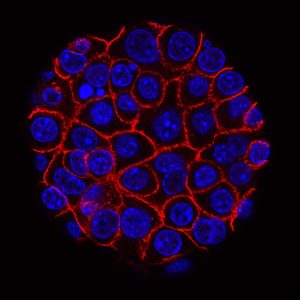
AI is more accurate than doctors at diagnosing breast cancer, study finds
pharmafile | January 2, 2020 | News story | Business Services | AI, AI Cancer, AI Trials, AI diagnoses, AI in clinical trials, Cancer, breast cancer
A recent study showed that Artificial Intelligence is more accurate than doctors in diagnosing breast cancer from mammograms.
The research was published in the journal Nature, and was conducted by a team that included researchers from Imperial College London and Google Health. They designed and trained a computer model on X-ray images from nearly 29,000 women and the algorithm outperformed six radiologists in reading mammograms.
The AI was given anonymous mammograms so that the women could not be identified and it only had the mammograms to go on for its diagnoses, compared to human experts who had access to the patient’s history.
The results showed that the AI was as good as the current double-reading system of two doctors and was superior at spotting cancer than a single doctor.
Compared to one radiologist, there was a reduction of 1.2% in false positives, when a mammogram is incorrectly diagnosed as abnormal. There was also a reduction of 2.7% in false negatives, where a cancer is missed.
Dominic King, from Google Health, commented on these results and said: “Our team is really proud of these research findings, which suggest that we are on our way to developing a tool that can help clinicians spot breast cancer with greater accuracy.”
Currently two radiologists have to oversee the diagnoses, but the use of AI would mean only one human would have to be involved. Reading X-rays is time consuming and there is an estimated shortage of more than 1,000 radiologists across the UK. The adoption of AI would help with these shortages.
Prof Ara Darzi, report co-author and Director of the Cancer Research UK (CRUK) Imperial Centre, said the results “went far beyond my expectations. It will have a significant impact on improving the quality of reporting, and also free up radiologists to do even more important things.”
Conor Kavanagh
Related Content

Geneos Therapeutics shares data from phase 1/2 trial for cancer vaccine
Geneos Therapeutics has announced that it has published positive safety, immunogenicity and efficacy data from …

FDA accepts BLA for AstraZeneca and Daiichi Sankyo’s datopotamab deruxtecan for breast cancer treatment
AstraZeneca and Daiichi Sankyo have announced that their Biologics License Application (BLA) for datopotamab deruxtecan …

Curve Therapeutics’ CSO publishes research on HIF inhibition for cancer treatment
Curve Therapeutics has announced that its chief scientific officer, Professor Ali Tavassoli has published research …








